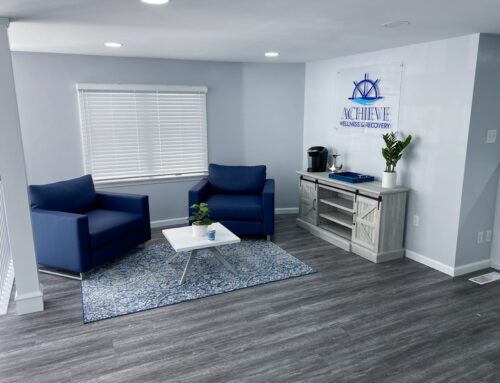According to the latest research, as much as 69% of the people who admit themselves to treatment for a substance use disorder also have a co-occurring mental health disorder.
This Achieve Wellness and Recovery article delves into what is dual-diagnosis treatment and why this form of addiction care is so important to successful recovery.
What is Dual-Diagnosis Treatment?
The term dual-diagnosis essentially refers to a scenario where an individual is diagnosed with at least two distinct conditions. Within the context of drug and alcohol therapy, it denotes a patient grappling with a substance use disorder (or addiction) alongside another mental health condition like depression or anxiety.
Studies indicate that up to 69% of people seeking addiction treatment also have a co-existing mental health condition. The problem is that only around 20% of drug rehab programs are set up to properly treat dual-diagnosis patients. The rest receive only a minimum of counseling or therapy and it’s very possible that their co-occurring disorder isn’t even diagnosed, much less treated.
Why Dual-Diagnosis Treatment Makes A Difference
The lack of sufficient capabilities to diagnose and treat co-occurring disorders at addiction treatment centers is a tremendous problem. It’s important to understand that it goes well beyond simply making the person suffering from addiction more comfortable and content.
Whether or not a condition like anxiety, depression, or PTSD is diagnosed and properly treated has an enormous impact on the recovering person’s chances for success in maintaining long-term sobriety. The fact is that undiagnosed and untreated co-occurring disorders are one of the most common causes of relapse. It’s not hard to understand why.
‘Self-Medicating’ Behavior and Other Factors
Many people end up with an addiction in the first place because they are attempting to relieve the symptoms of a co-occurring disorder like anxiety or depression. Oftentimes they are unaware this is the case, especially if they’ve never been formally diagnosed. In other situations, the co-occurring condition may simply exist in parallel to the substance abuse or it may even be caused in part by drug use.
At the minimum, drug misuse is never an effective solution. It may seem to provide temporary relief or a distraction from some symptoms — but ultimately it can only serve to make things worse for the person living with addiction and those around them. The substance abuse must be removed as a factor, the person must have an understanding of their diagnosis and they must be presented with a better way. A solution that moves them forward, without drugs and alcohol.
3 essential elements of dual-diagnosis treatment:
The Challenge of Co-Occurring Disorders
One of the biggest challenges in treating co-occurring disorders is that more often than not, people aren’t aware of them. A person caught in the throes of addiction knows they are unhappy and that their life has become unmanageable, but they may not be aware that substance abuse isn’t the only reason why.
In cases where ‘self-medicating’ occurs, people are more likely to recognize the possibility of an underlying mental health disorder. Even if they haven’t been formally diagnosed, they remember they began drinking to try to control their anxiety, or they started using cocaine because it seemed to be the only thing that alleviated their depression for a time.
Do I Need Dual-Diagnosis Addiction Treatment?
Addiction is often pure chaos. When a person is caught in the undertow of substance abuse, it’s very difficult to tell which of their symptoms came from a pre-existing disorder and which are a product of drug or alcohol abuse. Even a medical professional will need to spend some time with the patient, with the substance out of the picture to properly evaluate them.
Choosing a dual-diagnosis treatment program is a smart move for a few simple reasons. For one, most people with addiction aren’t aware they have a co-occurring condition in the first place. If only the people who think they need dual-diagnosis care seek it out, the majority won’t get the help they need.
Another reason is the fact that untreated mental health disorders are a leading cause of relapse. Finally, if you’re one of the 31 percent or so who don’t have a co-occurring condition — you have nothing to lose by receiving dual-diagnosis care.
When considering dual-diagnosis treatment:
Achieve Wellness and Recovery Has Answers
No one deserves to have their life derailed by drugs and alcohol. When substance use disorders are further complicated by a co-occurring condition like depression or a trauma disorder, it can feel like you’re caught in a riptide pulling you out to sea.
If you or someone you love is wrestling with substance abuse and/or a mental health disorder — Achieve Wellness and Recovery wants to help. Even if you’re not sure if you’re ready for treatment yet, just starting the conversation about recovery will give you a reason for home. Don’t wait.
If you have questions about dual-diagnosis treatment in NJ, we’ve got answers. Achieve Wellness and Recovery is dedicated to providing a safe place where people can heal and recover from addiction and live better lives.
Give Achieve Wellness and Recovery a call at (833) 680-0142
You can also click here to find out how our program can work with your insurance.








